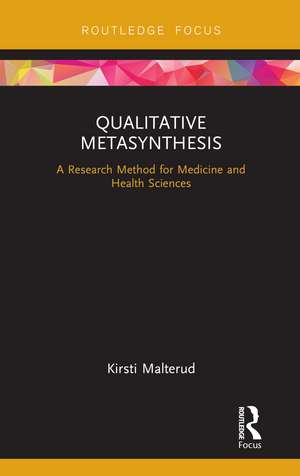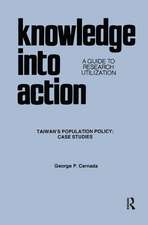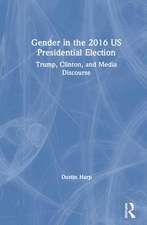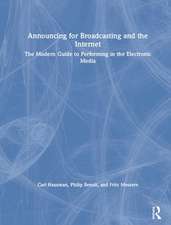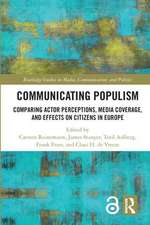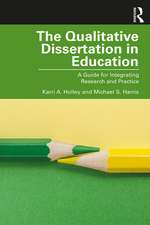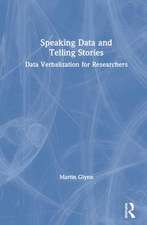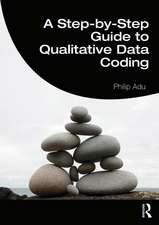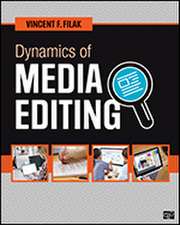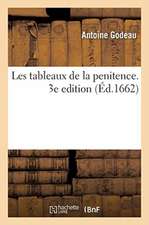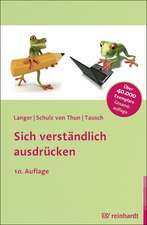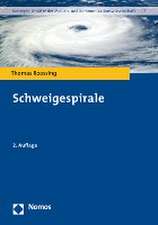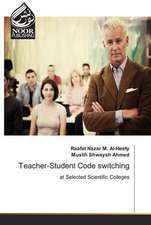Qualitative Metasynthesis: A Research Method for Medicine and Health Sciences
Autor Kirsti Malteruden Limba Engleză Hardback – 18 iun 2019
This book demonstrates how and why qualitative metasynthesis can be a method for reuse and expansion of medical knowledge. It presents the principles of metasynthesis as a qualitative research method, so that the reader can assess whether this is a research strategy that fits the aim of their study. The author offers practical advice for conducting research using this methodology. The presentation is illustrated by a study carried out by the author and collaborators, reflecting on real-life challenges and solutions as an example of meta-ethnography, one of the most frequently used strategies for qualitative metasynthesis. The author also looks at systematic reviews, a methodology developed within in the tradition of evidence-based medicine, discussing strengths, weaknesses and pitfalls of this methodology. Rooted in the interpretative paradigm, qualitative metasynthesis challenges several of the principles from the evidence-based medicine tradition, offering reflections on challenges when epistemologically very different methodologies intersect.
This book should be considered essential reading for anyone carrying out qualitative research within the fields of medicine, health and social care.
| Toate formatele și edițiile | Preț | Express |
|---|---|---|
| Paperback (1) | 122.34 lei 6-8 săpt. | |
| Taylor & Francis – 25 iun 2024 | 122.34 lei 6-8 săpt. | |
| Hardback (1) | 438.59 lei 6-8 săpt. | |
| Taylor & Francis – 18 iun 2019 | 438.59 lei 6-8 săpt. |
Preț: 438.59 lei
Preț vechi: 461.66 lei
-5% Nou
Puncte Express: 658
Preț estimativ în valută:
83.95€ • 87.31$ • 70.35£
83.95€ • 87.31$ • 70.35£
Carte tipărită la comandă
Livrare economică 13-27 martie
Preluare comenzi: 021 569.72.76
Specificații
ISBN-13: 9780367134181
ISBN-10: 0367134187
Pagini: 142
Ilustrații: 3 Line drawings, black and white; 4 Tables, black and white; 3 Illustrations, black and white
Dimensiuni: 138 x 216 x 15 mm
Greutate: 0.27 kg
Ediția:1
Editura: Taylor & Francis
Colecția Routledge
Locul publicării:Oxford, United Kingdom
ISBN-10: 0367134187
Pagini: 142
Ilustrații: 3 Line drawings, black and white; 4 Tables, black and white; 3 Illustrations, black and white
Dimensiuni: 138 x 216 x 15 mm
Greutate: 0.27 kg
Ediția:1
Editura: Taylor & Francis
Colecția Routledge
Locul publicării:Oxford, United Kingdom
Public țintă
Postgraduate and UndergraduateCuprins
List of abbreviations; Preface; 1 Utilization and upcycling of existing research knowledge; We do not have to start from scratch; Qualitative studies – an open mind, but no blank slates; Research waste or exploiting knowledge capital?; Recycling, upcycling and sustainable management of knowledge resources; What will this book offer you?; The role of the nursing home doctor in end-of-life care – a concrete example; From chaos and individual research reports to systematic reviews; Comprehensive and critical reading of the research literature; The information deluge; Broad mapping; Systematic reviews – a specific kind of research literature summary; Evidence from research results; Multipurpose knowledge capital; Evidence-based medicine; Different research questions require different evidence from relevant methodologies; From summary and renarration to interpretation and synthesis; Descriptive, interpretative or both?; Meta-analysis; Qualitative metasynthesis; Which kinds of research questions can be studied with qualitative metasynthesis?; 2 Project planning and literature management; Careful preparations are profitable investments; Summing up research – a stepwise process; A research question that is both flexible and determined; Choosing a strategy; The protocol; Registration of the project; Literature search; Overview and steady course; Search strategy; Search terms in logical combinations; Search sources and databases; Grey literature; Language; Before you set off seriously; Screening and selection of potentially relevant primary studies; Reference management; Systematic screening and rough classification; Reading candidate articles in depth with quality assessment; Supplementary search; What characterizes your sample?; Flowsheet for search and selection; Hallmarks of the primary studies; Identification of results from the primary studies; Organizing the material from data extraction; 3 Analysis and synthesis; Interpretation of the results from the primary studies; Synthesis is more than summary and renarration; Levels of interpretation – concepts of first, second and third orders; Different strategies for metasynthesis; Meta-ethnography; Background; Metaphors and translations; Analytical perspectives; Strategy for analysis – seven steps; The matrix as a tool for analysis; A specific example of analysis and synthesis; Contemporary meta-ethnography; Other methods for qualitative metasynthesis; Critical interpretive synthesis; Thematic synthesis; Realist synthesis; Reporting your study – writing the article; Elements in the article; Method, material and analysis; Synthesis and results; Transparency in reporting qualitative metasyntheses; 4 Theoretical and methodological challenges; Qualitative methods encounter evidence-based medicine; Scientific paradigms; Common features, differences and opposites; Social anthropology and metasynthesis; A complete and independent literature review?; Situated knowledges; Cherry picking; Finding the needle in the haystack; Independent appraisals or bias?; Which evidence is the best evidence?; The evidence hierarchy; A universal gold standard?; Grading of evidence; New pyramids; Diversity or standardization of knowledge; Merging apples and oranges – the synthesis of heterogeneous data; Sustainable evidence; Three steps forward and two steps back; Grading of qualitative metasynthesis; Mixed methods and qualitative metasynthesis; Qualitative and quantitative methods in the same study; Multi-methodological exploration of complex research questions; Qualitative metasynthesis with mixed methods; Synthesis of qualitative primary studies with different designs; 5 Final comments; thics and privacy protection; Regulations and approvals; Distance as a challenge; Contributing something new; What do you need to conduct a qualitative metasynthesis?; Competence and experience; Relevant primary studies with useful presentations of results; Resources and personal traits; Set off!; You are not alone; Newer and more exciting; Wheat or chaff?; Sustainable competence – new opportunities for collaboration; References; Index
Notă biografică
Kirsti Malterud, MD PhD, was a general practitioner for 35 years, combined with academic work as a researcher at Uni Research/NORCE Research Centre and a Professor of General Practice at the University of Bergen, Norway. Her list of research publications is extensive, with empirical studies about vulnerable groups of patients as well as methodological contributions on qualitative research methods.
Descriere
Qualitative Metasynthesis presents a research method developed for upcycling and synthesis of qualitative primary studies, aimed at researchers within medicine and health sciences.
